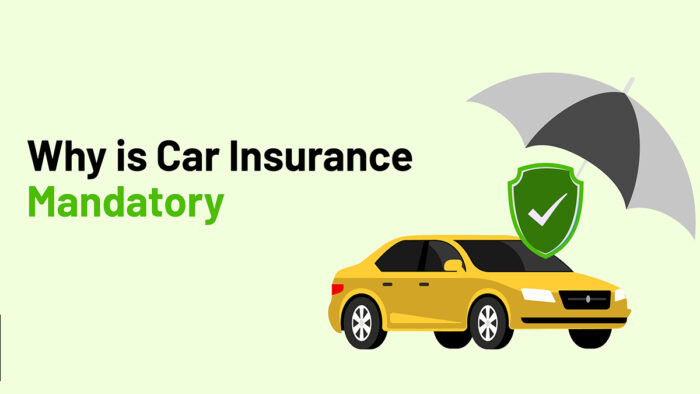Almost all the states in the United States require drivers to have car insurance. And those who do not require good proof of financial responsibility are in their place. But why is car insurance mandatory? And what happens if you drive around without car insurance?

The main reason why car insurance is mandatory is because it ensures that other people are protected in case you cause an accident.
Although car insurance can be very costly, it makes sure that every driver on the road, including you, is protected.
Driving without car insurance coverage can lead to penalties, fines, license suspensions, and even jail time.
Although not all coverage options are mandatory by law, there are certain types of coverage that are worth considering as they can protect your vehicle, you, and your passengers.
Why is Car insurance required?
Car insurance is mandated in order to protect people financially when they’re hurt or their property is damaged in an accident that’s not their fault.
For example, if another driver hits you and you’re injured or your car is damaged, their liability insurance will cover your property damage or medical expenses.
Similarly, if you are responsible for an accident, your liability insurance pays for other people’s medical bills, lost wages, and vehicle repairs.
Every state has its own law about car insurance, but most require drivers to have a minimum amount of liability insurance.
This coverage protects others if you are responsible for an accident. Some states also require personal injury protection (PIP). This covers medical expenses and lost wages for you and your passengers, no matter who is at fault.
Additionally, some states require uninsured/underinsured motorist coverage. This type of insurance helps if you are hit by a driver who doesn’t have enough coverage or no insurance at all.
The goal of these insurance requirements is to make sure that victims of accidents are compensated for their injuries and property damages. PIP is the only exception, as it offers coverage regardless of whether it is an at-fault accident.
Where is Car Insurance Mandatory?
Almost all the states in the USA (48 out of 50) require you to have minimum liability coverage, while some mandates include insured and underinsured motorist coverage, personal injury protection, and medical payments in addition to the liability requirements.
Knowing your auto insurance coverage requirements can prepare you in advance for the type of coverage you will need when you want to set up your insurance policy.
The only exceptions to the state law mandates are Virginia and New Hampshire, where auto insurance is not mandatory. New Hampshire requires you to have the minimum financial requirements to forego car insurance.
Also, if you cause an accident, you would be held responsible for paying costs for vehicle damage, legal fees, and injuries out of pocket.
While in Virginia, you can pay a $500 uninsured motor vehicle fee every year. However, it offers zero coverage if you are responsible for an accident.
What Types of Auto Insurance Are Mandatory?
All states have different minimum insurance requirements. And depending on your insurance profile, the amount and type may change.
If you do not stay in Virginia or New Hampshire, it is illegal to drive without the minimum coverage. The most common auto insurance requirement is liability car insurance.
Minimum Liability Auto Insurance
Liability car insurance helps to pay for the medical bills and property repairs of other people in case you cause an accident.
Since your car can hurt other people and damage things, you need enough coverage to cover those costs. It is important that every driver have at least the minimum amount of liability insurance required by their state.
Keep in mind that there are two parts to liability insurance: bodily injury coverage and property damage coverage.
Also, remember that liability insurance does not pay for your own injuries or car repairs if you are involved in an accident.
Types of Car Insurance that may be Mandatory
Although minimum liability car coverage is required by law in most states, there are other coverages required in some states and recommended in others. They include;
- Collision insurance: this takes care of the repair bills for your vehicle after an accident, regardless of who is responsible.
- Comprehensive: This helps to pay for vehicle damages that are not related to auto accidents, such as falling objects, floods, animals, or other natural disasters. It also helps to pay for stolen or vandalized vehicles.
- Medical payment coverage: This covers medical bills for you and your passengers after an accident but does not cover lost wages.
- Personal Injury Protection (PIP): This helps to cover medical expenses for you and your passengers after an accident, but it won’t cover lost wages.
- Underinsured or uninsured motorist coverage: This will help you pay for medical bills and property damages if you are a victim of a hit-and-run. Also, it will cover you if you get into a car accident with a driver who has no or little auto coverage.
Keep in mind that collision and comprehensive insurance are not legally required by states, but most auto loan lenders require them.
While uninsured or underinsured motorist coverage is required in 20 states, including Washington, D.C.
MedPay is required in Maine and in New Hampshire if the driver chooses to get an auto policy. PIP is mandated in 12 no-fault states.
A no-fault state is a state where drivers use their own policy to cover their own vehicle damage or injuries, regardless of who is at fault.
How Much Does Mandatory Car Insurance Cost?
The average cost of minimum liability auto insurance is $627 every year. Full coverage is $2,008 every year.
However, the rates will be different for every policyholder based on certain factors. These factors include their company, age, driving profile, marital status, driving record, location, gender, credit score, and type of vehicle.
Car insurance is legally mandatory, so you can drive your vehicle and protect yourself and others in case of an accident. According to state law, everyone is required to have a minimum amount of car insurance. It is also a good idea to meet with your insurer or agent to know if you need additional coverage.



